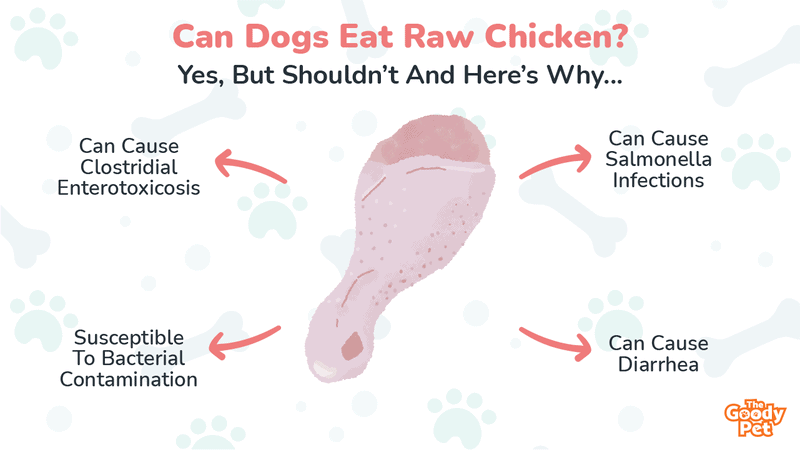If your dog loves to follow you to the kitchen, those small pieces of food hitting the floor could be their source of motivation. And while these little tidbits most of the time work just fine for their health, it’s normal to worry when it comes to some foods, for instance, raw chicken. So, can you feed dogs raw chicken?
Yes, you can feed dogs raw chicken, but you shouldn’t. Raw chicken is the most favorable medium for carrying Salmonella, so feeding your dog this type of meat exposes them to the risk of Salmonella infection, causing your dog to fall sick or even worse for those with weakened immune systems.
Today, we will be discussing why you should never give dogs raw chicken. Beginning with whether it’s safe for dogs to eat raw chicken to what happens when they eat it to how you can serve chicken to dogs, we have all your queries well addressed here. So yes, if you’ve been wondering whether to introduce raw chicken to your dog’s diet, you are just in for an informative session. Follow closely to learn more!
Is It Safe For Dogs To Eat Raw Chicken?
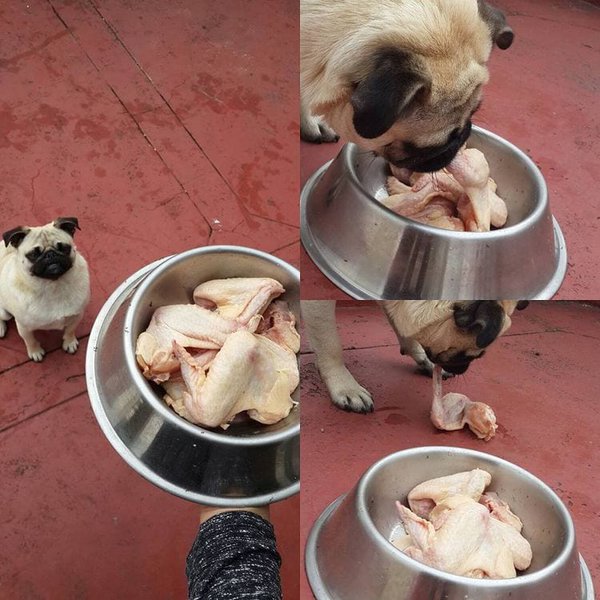
No, it isn’t safe to feed dogs raw chicken. Raw chicken is more susceptible to bacterial contamination that can sicken dogs. As such, most canine nutritionists discourage offering uncooked chicken to dogs.
Chicken is undoubtedly a favorite meal for many around the world. In fact, it is the most consumed type of meat in the United States. Whether chicken is coming in the stew, fried rice, or any other recipe, we just can’t get enough of it.
And as humans, we only eat cooked chicken. That’s how we love it and what works best for our bellies. In fact, it also applies to the majority of other foods. But must it be the case for canines? Should dogs always eat cooked chicken too?
Well, any scientist specializing in canine health will confirm that dogs have more acidic digestive juices than humans. In other words, compared to the human digestive system, dogs’ stomachs put up a better fight against bacteria and other contaminants likely to come with food.
Nevertheless, that doesn’t mean you should deliberately feed dogs food more likely to contain harmful elements, for instance, raw chicken. As much as dogs have better protection against pathogens, don’t put that ability to test.
Perhaps you have an immunocompromised dog, meaning they can’t fight foreign elements effectively. So yes, if you have to offer your dog chicken, ensure it’s well cooked and free from microbes.
Can A Dog Eat Raw Chicken Breast?
No, dogs can neither eat raw chicken breast. Uncooked chicken breast, much like any other part, can have disease-causing microorganisms. Hence, as you keep your dog away from uncooked chicken, also ensure you don’t offer the raw chicken breast.
Let’s face it – there’s something special about chicken breast. That’s one thing every chicken lover knows very well. In fact, chicken breast is widely considered the best part of the chicken. Perhaps that’s because it’s the part with the lowest amount of fat.
But again, being low in fat doesn’t mean it repels bacteria and other contaminants. Chicken breast can come teeming with bacteria like any other part of a chicken. Hence, if you were contemplating feeding your pooch raw chicken breast, that’s again a no-no treat for them.
What Will Happen If My Dog Eats Raw Chicken?
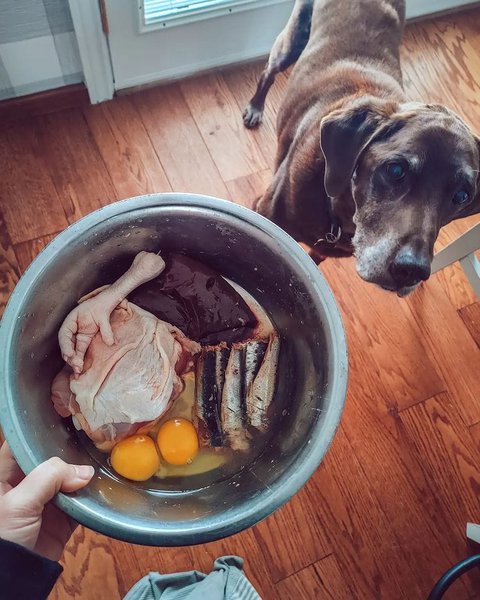
What will happen if your dog eats raw chicken will depend on whether there was something harmful in the meat. If there were any microbes in the food, then there are chances they could develop issues from the raw chicken.
There’s nothing weird about dogs eating raw chicken. Pups initially lived in the “unforgiving” wild, and uncooked meat was the type of food nature offered there. Actually, canines have evolved over the years to fit best in the home environment.
And while it’s a welcome evolution, adapting to a more “forgiving” environment also means that dogs’ bodies no longer possess the initial power they had to fight bacteria and other toxins.
Initially, contaminants in meat would not cause issues for dogs most of the time. But that’s not the case with their now “weaker” immune systems. Pups can develop problems when they eat raw chicken containing anything harmful.
So yes, if your dog ate raw chicken that you suspect to have bacteria or any other form of disease-causing microorganisms, you can expect them to react to it. But again, that will depend on how much they ate.
As much as the dog immune system no longer possesses its original ability to fight germs and other foreign elements, it still offers some defense against intruders. In fact, as we’ve said, dogs’ stomach acids are tougher on bacteria than the stomach of humans can muster.
So yes, a small piece or two of contaminated raw chicken will, most of the time, not cause your dog any health issues. However, when the quantity exceeds that, the chances of your dog developing health issues from it become more pronounced.
Can A Dog Get Sick From Eating Raw Chicken?
Yes, a dog can get sick from eating raw chicken. But that won’t happen all the time a dog eats raw chicken. Sickness can only come from contaminants present in the food and not necessarily the food’s mere uncooked form.
In other words, it’s possible to feed your dog a whole raw chicken and not pick up any issue from it. But that’s only if the meat doesn’t have Campylobacter, Clostridium perfringens, or other likely bacteria in raw chicken.
In the event of eating contaminated chicken, your dog stands a chance of getting sick. That’s where quantity comes in. More contaminated chicken means more pathogens get ingested, and thus, the dog is more likely to get sick.
Let’s take Campylobacter, for instance. When dogs eat raw chicken containing this bacteria, they can experience side effects such as fever, cramping or abdominal pain, and lethargy. The magnitude of the signs could be mild or severe depending on the amount of bacteria present in the food.
On the other hand, Clostridium perfringens produces dangerous toxins called enterotoxins after ingestion. The toxins will cause clostridial enterotoxicosis, a deadly condition that calls for prompt medical attention.
So yes, if you were wondering whether raw chicken can make your dog ill, then the answer is yes, it can sicken your dog! That’s why we again insist if you want your four-footed furry companion to enjoy chicken, ensure it’s not in the raw form.
Can Raw Chicken Give My Dog Diarrhea?
Yes, raw chicken can give your dog diarrhea. Dogs have super-sensitive stomachs and can develop diarrhea and other gastrointestinal issues from any food, including raw chicken. However, diarrhea will only emanate from unhealthy feeding.
When we talk of unhealthy eating, it’s a broad term. It extends far beyond just eating food containing microbes. More precisely, unhealthy eating also entails feeding dogs more than they should. Actually, the latter is arguably the leading cause of diarrhea in dogs.
True, microbes in raw chicken can cause diarrhea in dogs. In fact, bacterial infections will most of the time manifest through diarrhea. That includes infection by Campylobacter, Clostridium perfringens, and other bacteria not mentioned in this coverage.
Nonetheless, diarrhea isn’t always a sign of bacterial infection. It could also imply overfeeding. That’s why it can even happen after you feed your dog cooked chicken or toxin-free raw chicken. So yes, diarrhea doesn’t always emanate from contaminants.
Can Dogs Get Salmonella From Raw Chicken?
Yes, dogs can get Salmonella from raw chicken. And while it isn’t the only threat in raw chicken, Salmonella is the top reason dog experts discourage feeding dogs raw meat such as chicken.
Just so you know, there are two most common pathogens you will likely find in chicken – Salmonella and Campylobacter. They both are dangerous to humans and dogs alike, but Salmonella is more common and often more fatal.
Salmonella bacteria just love raw chicken, and why that’s so still puzzles scientists. Some argue it’s because chicken is likely to come into contact with infected animal feces, especially during the slaughtering process.
That claim makes some sense, but it fails to justify why this bacteria is still common in raw chicken even after slaughterhouses adhere to standards developed to help reduce its contamination.
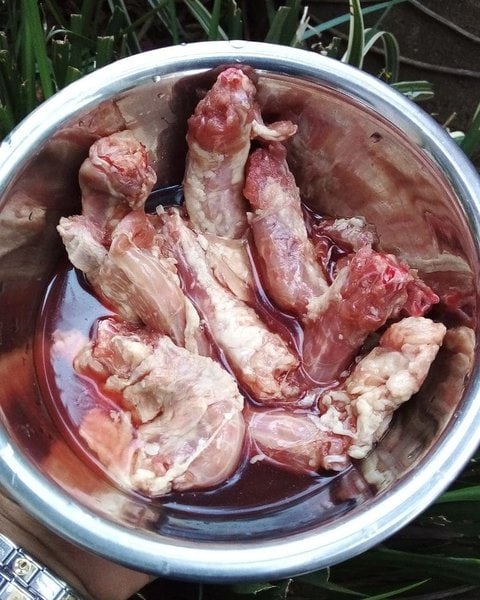
Does All Raw Chicken Have Salmonella?
No, not all raw chicken have Salmonella. According to the Centers for Disease Control and Prevention, in every 25 packages of raw chicken in the grocery store, about one of them contains Salmonella.
Based on the statistics, the chances of the chicken you buy from these stores having Salmonella are considerably slim. But again, that’s only Salmonella. Raw chicken is susceptible to more than just one bacteria. So yes, there’s much more to fear in uncooked chicken than just one bacteria.
What’s even worse, after your dog eats chicken containing Salmonella, it can pass the bacteria to you. Yes, you can easily pick up this bacteria by touching dog poop containing Salmonella. That’s why you always have to wear gloves when you suspect the work you are doing could expose you to your canine’s poop.
How Can You Tell If A Raw Chicken Has Salmonella?
Unfortunately, there is no simple way to tell if a raw chicken has Salmonella. As dangerous as this bacteria sounds, it’s microscopic. As such, unless with the help of sophisticated tools, there’s no way you can know that a raw chicken has Salmonella bacteria by just looking at it.
Nevertheless, if you rear chickens, then you can tell that they have Salmonella infection by looking out for a few signs. Cases of infection manifest through lethargy, low appetite, and increased thirst. You may also notice the infected chicken having sulfur yellow or green diarrhea.
But again, when you notice any or even all of these signs, it doesn’t always imply Salmonella infection. We have several conditions that manifest with the same signs. So yes, you need an expert to make a diagnosis.
How Do You Serve Chicken To Dogs?
To serve chicken to dogs, ensure that you cook it thoroughly without seasonings, onions, or any other potentially harmful ingredient for dogs. That way, your fur baby will benefit from the nutrients it offers without putting their health at stake.
You see, chicken has so much to offer – not just to us but to our furry friends too. However, whether or not dogs will benefit from the nutrients it has depends on how we serve the delicacy.
To start off, the way we usually cook chicken doesn’t work best for canines. You see, when making chicken, we want to add seasonings, salt, and all those kind of stuff. And while that makes it tasty to us, it doesn’t work fine for dogs.
Sure, given a chance, dogs will choose their chicken to come with all those additional ingredients. However, that’s not what their bellies want. The dog’s digestive system works best with plain chicken. As such, always offer pups chicken in its purest natural flavor.
It may not be the tastiest version of chicken, but it’s the healthiest. So yes, if you want to offer your dog chicken, avoid using any of the potentially harmful ingredients. That involves salt, onions, and garlic, to mention but a few.
So, what’s the best way to cook chicken for dogs? Well, since you want it as bland as possible, consider boiling it. You only need water for this. The process is simple;
- Put chicken breast in a pot containing water.
- Wait for the water to boil.
- Boil the chicken until it’s cooked thoroughly. This step could take 12 minutes or more.
- Cut the chicken into pieces and wait for it to cool off.
- Give your dog a small piece of it.
If you were keen, you might have noticed that we were precise on the part to cook. In other words, as much as boiled plain chicken is healthy and will benefit your dog, you still have to choose what goes into that pot. We recommend chicken breast – and for a good reason! Chicken breast is generally lean.
Again, you still have to follow the principle of portion control when giving chicken to your dog. As much as you are offering low-fat chicken without seasonings or any other ingredients, you still can’t ignore the quantity your dog eats, and that ushers us into the next section!
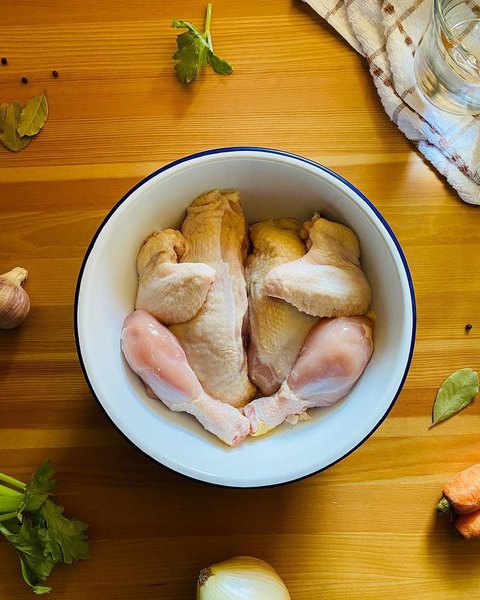
How Much Boiled Chicken Should I Give My Dog?
The amount of boiled chicken you should give a dog depends on its size. Most vets recommend about ¼ to ⅓ cup of cooked chicken for every 20 lbs of weight. However, if it’s the first time, begin with a much smaller amount and increase it slowly till you get to the vet’s recommended levels.
The right amount of chicken will do your dog a world of good. This delicious meat supplies dogs with lean protein, omega–6, glucosamine, and lots of other nutrients. Every dog obviously needs all these for healthy growth.
But again, you don’t want to violate the two basic rules of feeding dogs. The first rule is always consult the vet before you offer your dog anything new. The expert will tell you whether it’s safe to proceed and, if yes, how to get started.
The second rule; start out with a small quantity. That is to help you know whether your canine can develop anything adverse from eating chicken. Perhaps your dog has a chicken allergy! It’s from the outcome that you can either gradually increase the amount or avoid chicken altogether.
Is It OK To Feed My Dog Chicken Every Day?
No, it is not okay to feed your dog chicken every day. While your dog will likely enjoy eating chicken day in and day out, it’s generally not a good practice. Dogs also need other nutrients not present in chicken, so always alternate it with other foods.
And just so you know, we don’t in any way mean that giving dogs chicken is unhealthy. Not at all! We only emphasize that chicken won’t offer your dog everything they need. That’s our only main concern. So, if you have to offer chicken every day, combine it with a few add-ons to boost the nutritional value of the food.
If your dog has a delicate stomach, boiled chicken and plain white rice make a thoughtful combination. For healthy dogs, you can think of carrots and pumpkins. Either will work with chicken very well.
If you intend to offer chicken without any add-ons, it’s best to have it come occasionally. Once or twice a week will do just fine. But again, always give more attention to what the veterinarian says concerning feeding your dog chicken.

